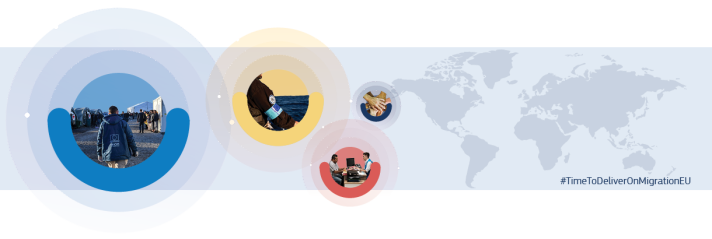May 2021 has seen an increase in the number of people trying to come to Europe by irregular means.
There are still the lowest numbers for almost a decade, but there is an all too familiar pattern. One that the European Union must work on tackling, together. That pattern is the loss of life due to the huge risk attached to sea crossings. Flimsy rafts, bad weather, desperation and heartless smugglers combine with deadly result. Despite decreased departures in 2020, 1,754 persons were reported dead or missing compared to 2,095 persons in 2019.
This year we have had 600 deaths.
Recent weeks have seen tragedies in both the central Mediterranean and the Atlantic. The 130 lost on 22 April off the Libyan coast, and the story of Aicha, one of only 3 survivors from 59 who had left Mauritania 22 days previously. The first I spoke about here and the second in the European Parliament Plenary last week here. I wanted to highlight the human tragedy, the desperation and the finality of these tragedies.
But words are not enough. The final tragedy is at sea but the sustainable solution lies on dry land. To prevent these deadly travels to even start. That is why I have invested in this issue in the context of a ‘Europeanised’ migration management system and the proposals I tabled last September.
The European Union may be restricted in our legal capacity to lead on coordinating search and rescue operations but we are free to show moral and political leadership.
To avoid tragic incidents at sea, we have proposed a Recommendation for a framework of cooperation between different actors in search and rescue operations carried out by private vessels as their predominant activity or by commercial vessels. The Recommendation also repeats the obligation under international law to ensure swift disembarkation in the closest port of safety.
I have created a European Contact Group of Member States on search and rescue, which met for the first time on 22 March, with the objective of reinforcing cooperation. As I said at the time, this expert group is one of the first concrete results of our new pact. The Group will meet again before summer.
The Group will ensure regular liaising with all relevant stakeholders such as the private entities owning or operating vessels that carry out Search and Rescue operations as their predominant activity, commercial vessels, EU Agencies such as Frontex, or the International Maritime Organization.
Coming soon we will update the European Border Surveillance System (EUROSUR). This will make it compulsory for Member States to report search and rescue operations and incidents.
And I have proposed for the first time a binding system of solidarity, including relocations, tailored made to Search and Rescue cases. Since people need support. Since Member States with sea borders need specific support. Since geography should not play a role - search and rescue operations are carried out for the union as a whole.
We must also fight those who trick, and sometimes even force, people into these fragile boats. I will present the EU action plan on fighting migrant smuggling in the next semester.
This is about smashing the organised crime rings that condemn desperate people to a desperate fate.
But that is only the beginning. It shows the coordination that is going on, on ‘dry land’ on both sides of the Mediterranean, but we also need to provide more options to the people themselves that show them clearly that the sea route is the wrong option.
Next week I will go into more details on our legal pathways. Including our proposals on talent partnerships and our recent success on the Europeans Blue Card.
This is a weekly blog outlining the benefits of the proposals on migration tabled by the European Commission on 23 September 2020. For more detail New Pact on Migration and Asylum | European Commission (europa.eu)
Details
- Publication date
- 23 May 2021
- Author
- Directorate-General for Communication

